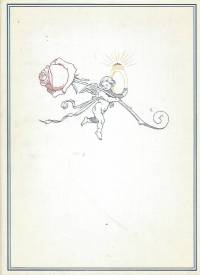This tale by the famed English satirist William Makepeace Thackeray (1811-1863), author of the highly respected Vanity Fair, is a children’s story filled with humor and sprinkled lavishly with nonsense. It is the story of a Fairy Queen, the hero Prince Giglio of Paflagonia and the heroine Princess Rosalba of Crim Tartary, a king of two kingdoms, their offspring, and an old ugly woman. Virtually every name in the tale is funny, as is all the incidences.
The legitimate king and queen of both kingdoms were dethroned by people who should not have done so. The son of one kingdom is kept in the palace but receives no education and cannot even spell. The daughter of the other kingdom wandered away during the rebellion and was raised by lions. A fairy was invited to all royal births and gave magical gifts. She gave a magical ring to the mother of the uneducated boy before the rebellion, who passed it on to her son, and a feather to the son of the other kingdom after his father ceased the kingdom.
Both items made the wearer appear to be the most handsome or beautiful person in the kingdom. The fairy became tired of giving magical gifts and so, at the birth of the later uneducated son and the birth of the daughter who was later raised by lions, she gave the wish that the suffer some adversities (and therein lies the moral of the tale). All of the fairies gifts, of course, came true, and therein lies the story.
For example, different people secured the ring and feather at different times. Once, an ugly old lady picked up the ring and the uneducated son fell in love with her and promised to marry her, and signed a paper to that effect. But later, when she wasn’t wearing the ring, he fell in love with the girl who was raised by the lions. What could he do?


